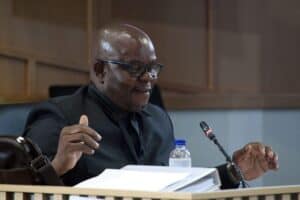The son of anti-apartheid activist Fort Calata said Mbeki is attempting to prevent an in-depth look at how his administration failed to hold apartheid criminals accountable.

The son of a former anti-apartheid activist has accused former president Thabo Mbeki of trying to “shield his reputation” by intervening in a lawsuit against the government for failing to investigate and prosecute crimes committed during apartheid.
The families of apartheid victims have accused the government of interfering in the investigation or prosecution of apartheid-era crimes referred by the Truth and Reconciliation Commission (TRC).
Mbeki intervenes in apartheid victims’ lawsuit
Mbeki and former minister of justice Brigitte Mabandla filed applications to intervene as respondents in the matter. The former president said the lawsuit could damage his reputation and expose him to legal liability.
The 25 families and survivors of apartheid-era crimes approached the High Court in Pretoria in January.
ALSO READ: Apartheid-era survivors demand justice in court
The TRC recommended hundreds of cases for further investigation and prosecution. The survivors and family members of victims of apartheid crimes have argued in the lawsuit that there was unconstitutional, unlawful and criminal conduct by the government to prevent these prosecutions.
“[Mabandla] and I may be exposed to potential personal liability by those who claim to be victims such unconstitutional, unlawful and criminal conduct,” he said.
Apartheid activist’s son slams Mbeki
However, Lukhanyo Calata, the son of anti-apartheid activist Fort Calata, has rejected Mbeki’s argument.
Fort Calata was part of the Cradock Four. The four anti-apartheid activists, Calata, Matthew Goniwe, Sparrow Mkonto, and Sicelo Mhlauli, were abducted and murdered by South African security police in 1985.
Lukhanyo accused Mbeki and Mabandla of attempting to prevent an in-depth look at how their administration failed to hold apartheid criminals accountable.
“I reject the claim that they have a direct or substantial interest in this matter, as no relief is sought against them personally. Their intervention appears to be an attempt to shield their reputations,” he told City Press.
Lukhanyo further said the court only had to determine if there was interference in the investigation and prosecution of the TRC cases. It did not have to determine why or how they were blocked, nor who was involved.
ALSO READ: Ramaphosa launches commission of inquiry into apartheid-era justice delays
Commission of inquiry into apartheid cases being delayed
He added that the commission of inquiry, recently established by President Cyril Ramaphosa, would do this.
On 30 April, the Presidency said the commission will “probe allegations of improper influence in delaying or hindering the investigation and prosecution of crimes referred by the TRC”.
“Government has maintained that these outstanding matters would be most appropriately addressed through the Commission of Inquiry and will therefore be included in the Commission’s terms of reference,” said Presidency spokesperson Vincent Magwenya.
“President Ramaphosa continues to maintain that all affected families deserve closure and justice.”
NOW READ: NPA reopens inquests into Chief Albert Luthuli and Griffiths Mxenge’s deaths






